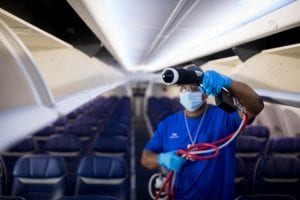Skift Take
With fundamental changes to travel habits and patterns on the horizon, this is a profession that stands to be completely reinvented too.
Coronavirus, obviously, is front of mind as we dive into a new year, but dig a little deeper and there are other pressing matters that travel managers, and their agencies, will be facing.
Some are new, such as the impact of remote working, while others have been bubbling away for some time, like travel’s environmental impact — a hot topic until the pandemic struck.
Skift talked to some of the sector’s movers and shakers for their take of what’s in store.
Grasping New Technology, Reinventing a Role
The pace at which new technologies and platforms were adopted in 2020 was unnerving. It’s more than people switching to Zoom, because the lull in business travel and meetings freed up time for many travel tech startups to innovate.
Overall, technology is designed to drive efficiency, and make lives easier, but at the same time it worries some travel managers. Are they going to be replaced by robots?
“The responsibilities of a corporate travel manager will become fewer — even by 50 percent — because companies know employees are able to communicate efficiently online now,” said Hansang Lee, purchasing manager at Continental, at a recent CAPA Centre for Aviation event when quizzed on technology’s impact. “They’ve learned lessons from the Covid situation. Unfortunately the role will be less important, but we have to find out another way to (elevate) this job.”
However, the role of the travel manager has in some ways been escalated. “Yes, before they’d be talking to chief financial officers,” said Alex Kaluzny, chief technology officer at Egencia. “Now, everyone really wants to know what is happening.”
In a recent survey of Egencia customers, he said 54 percent of travel managers said they were having more engagement with their executive leadership team, which is 50 percent higher than before Covid.
Technology is a key focus for the corporate travel agency in 2021. While there was talk of continuous pricing last year, where airlines dynamically adjust fares in response to real-time demand, Egencia wants to spend 2021 looking at dynamic travel policies, powered by artificial intelligence, to help travel managers iron out some of the quirky rules that don’t make sense.

Travel managers have had to assess new health protocols by different airlines. Picture: Southwest Airlines.
“I have teams based in Chicago and Delhi. If someone wants to fly from Chicago to Delhi, there’s a direct flight with Air India and business class is fairly cheap,” said Kaluzny. “If you have a company that says business class is prohibited, but premium economy is allowed, you can book another carrier through Europe, on a longer flight, and the fare might be more expensive than Air India’s business class.”
CWT, meanwhile, wants to support travel managers who may feel that their organizations will forget about the importance of travel. “We’re focused on bringing people back to human connection and weaning people off video, and getting them back out into the world,” said Michelle Frymire, its president of strategy and transformation, and chief financial officer.
Frymire said CWT’s aim will be to simplify travel for its customers, by leveraging any flight corridors and cutting out the “disaggregated information” about how to travel safely — information that will only increase as people start to travel again.
“When you have to sell, human connection matters. I’m not going to pick a provider, like Oracle, or Accenture, based on talking to somebody on video. I want to meet them: do I like the chemistry? That’s what is missing from video,” she said. “We know that’s what people want to do, but how do they do it? We need to provide that avenue for them to do it. We need to bring the next normal to clients, because the old normal has gone.”
Managing Mobility and a Scattered Workforce
Travel managers faced enormous pressure in 2020, from repatriating staff and dealing with refunds to later working around border restrictions and assessing health risks.
But there’ll be no let-up in 2021 as the work-from-anywhere trend goes mainstream. It’s perhaps the most significant after effect of coronavirus.
“What happens when you have employees who choose to work from anywhere? What’s the policy going to be when reimbursing people who choose to live far from the headquarters?” asks Scott Gillespie, CEO of consultancy tClara, “What if they’re working from Tahiti for two months? Are they going to fly them in from Tahiti? It’s going to be a messy issue.”
With remote employees comes the wider area of mobility. Rather than getting from point A to B, travel managers will be drawn into all aspects of how they get around.
“Mobility is becoming a big subject,” said Daniel Tallos, travel manager at an international retailer. “In the past, human resources teams pretended they owned it, because they owned the policies, and funding, but more companies now realize there’s an amalgamation of needs, and personas and profiles, and suppliers; companies like Sixt, for example, are pushing hard into that space.”

How will travel managers deal with employees who to choose work remotely from places like Tahiti? Picture: Kazuo Ota/Unsplash
Tallos said travel teams were getting involved because there is less travel. And when the world is the employee’s office, it’s going to get complicated.
“There are different tax rules when it comes to mobility, and with business travel there’s the question of equality and entitlement. What is the rule of the office? Are they even open? Travel managers won’t really be given the choice but to move into this area,” he said.
Sustainability Becomes More Important Than Ever Before
The corporate travel sector will also be facing more scrutiny in 2021 over its eco-credentials. In the U.S. in particular, President Biden’s commitment to the Paris Agreement will see climate change rise up the corporate agenda.
“Our country now has a president that is clearly and firmly committed to taking on the issue of climate change,” said tClara’s Gillespie. “This will add no small amount of momentum to factoring sustainability into the decisions about the need to travel. In 2021, we’ll begin to see it. It won’t be so much a function of what travel managers say or do, it’s going to be executives, travelers and budget owners being more sensitive to the issue of what can be done by Zoom and Teams. Carbon offset programs and other sustainability initiatives will take on greater importance in 2021 and beyond.”
Tallos agrees. “We have been speeding up our sustainability efforts. We try to set objectives with large suppliers, and follow up on them. Depending on the relative maturity of the supplier, we try to bring them to the next level, as opposed to waiting on them to make an effort. We’ve also included 15 sustainability related questions into our request for proposals.”
Airlines, including Air France, have also been required to reduce their environmental footprints as part of government bailouts, meaning some short-haul flights will be replaced by rail.
It’s been said that the pandemic gives the travel industry a chance to reset itself, to bounce back in a more meaningful way. The way businesses think about how, and why, they travel in the future will be a part of this process.
The Daily Newsletter
Our daily coverage of the global travel industry. Written by editors and analysts from across Skift’s brands.
Have a confidential tip for Skift? Get in touch
Tags: climate change, corporate travel management, cwt, egencia, sustainability
Photo credit: The corporate travel sector will be facing more scrutiny over its environmental impact in 2021. Uri Paz / Unsplash
